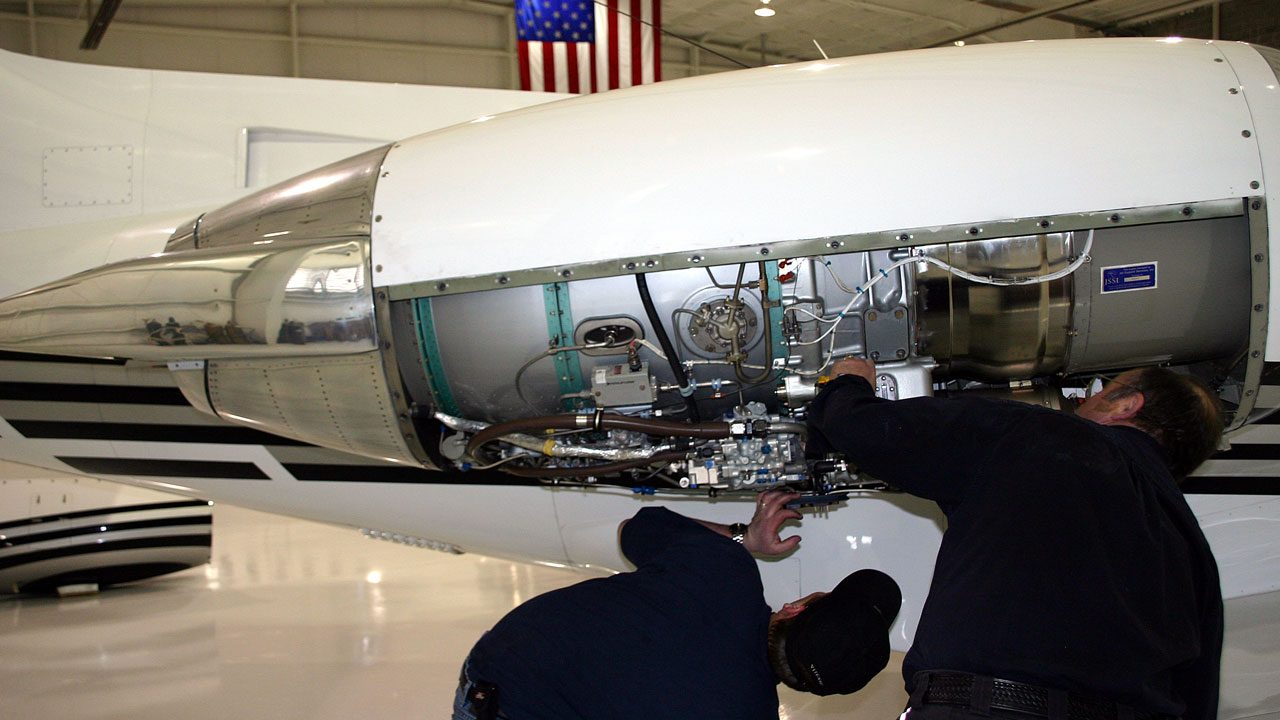Looking to build a solution aviation maintenance staff? Whether you’re an aviation maintenance manager looking to create a strong, smoothly functioning team or an up-and-coming technical professional seeking to become a manager, there are some qualities to either watch out for or cultivate in yourself to help further your cause.
In the first of a two-part blog series, let’s take a look at seven of those qualities. This information is gleaned from interviews with aviation maintenance leaders as well as my personal business aviation recruiting experience.
7 Qualities Needed for a Solid Aviation Maintenance Staff
1. Recruit for attitude, commitment and drive
A candidate for maintenance director is like a high-potential employee in hundreds of other industries—he or she comes to work every day in the right frame of mind.
They demonstrate drive and commitment in everything they undertake–and they take a broad view of their responsibilities, too. One Fortune 500 maintenance director that I spoke with says that the key to success in this industry is to become the best-rounded individual possible.
“Think about what skills you lack and start building on them,” he notes. “Attend conferences and seminars, and network. I cannot emphasize the importance of networking, as this is a small industry and it’s proven to be very beneficial.”
2. Look for adequately trained professionals
For background, a good candidate for maintenance management is well-versed and licensed in airframe and powerplant (A&P) functions, has a bachelor’s degree in a related field and, as a bonus, might even boast some flight skills, such as an airline transport pilot (ATP) license.
3. Choose to take on greater responsibility
If you’re preparing to go into aviation maintenance management, you’re the type of employee who’s always thinking about how you can ready yourself to take on a greater role or function within your department.
For example, you’re performing your current job, but doing course work and learning more and more all the time. And not just hands-on work associated with maintenance.
4. Recruit for solid verbal communication skills
There are some skills that are universally acknowledged as being required of every leader, and knowing how to communicate effectively is one of them.
Everyone should be aware that the aviation maintenance function serves as a major communication hub for the majority of the business aviation operation.
Maintenance directors’ duties range from technician coverage of arrivals and departures to the planning for maintenance downtime of aircraft. It’s critical to maintain relationships and open channels of communication with various stakeholders in order to permit a smooth flow of information.
A successful director knows how to use tact and persuasion, eliciting the most valuable information from pilots and other crew members. They will evaluate this information and translate it effectively with their aircraft manufacturer partners and others in the course of their work.
5. Assess leadership skills
According to a female Fortune 500 director of aviation maintenance, leadership qualities often “bubble to the surface” within a flight department.
“Knowing you’re a leader is as important as knowing you have mechanical skills,” she points out. “The key is to nurture that ability through experience and education so when the opportunity arises you will be ready.”
She adds that most companies seek out candidates with character and enduring values, such as integrity, teamwork, respect, diversity and inclusion—and an all-important spirit of winning.
6. Hire well-rounded exposure and experience
Top-performing aviation maintenance directors make sure to align themselves with their counterparts, the business aviation directors.
Keep in mind, they’re professional equals and need to learn to speak the same language to the team to create seamlessness in all aviation operations.
The aviation maintenance director should also have a seat at the table with key stakeholders within the organization, but not have a voice in it for selfish reasons.
They should make sure, too, that they maintain a great network—OEM, satcom partners, parts suppliers, etc. And they shouldn’t forget to be proactive: When aircraft are out flying, what are you, as an aviation maintenance director, doing to ensure that your team is ready when they land?
7. Embrace the entire business aviation “wheel”
On your career ladder, you might have your eyes on a specific aviation maintenance management position, but don’t forget how important it is to express and explore an interest in the entire business aviation profession.
At the director level, it’s almost guaranteed that your position will be interdependent with all the other leadership roles in your company’s aviation organization, so the more you know, understand and embrace, the better off you will be.
Now that you’ve reviewed some of the leading qualities an aviation maintenance manager or director should possess, you’ll want to follow up with part II of this series, when I delve into some of the more pertinent details of my discussion with three seasoned aviation maintenance directors. I promise that their comments about their experiences will both surprise and enlighten you.
Your Turn
Do you have experience helping to build a solid maintenance aviation staff in a business aviation environment? Or are you the member of a team with experience in taking that next important step up the career ladder within your organization?
If so, and you have some tips to share to help your colleagues achieve greater levels of success, we’d enjoy hearing from you.
Next, we invite you to read part two in this series regarding ways to build your aviation maintenance staff.

